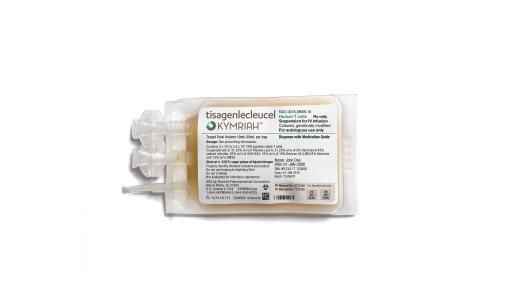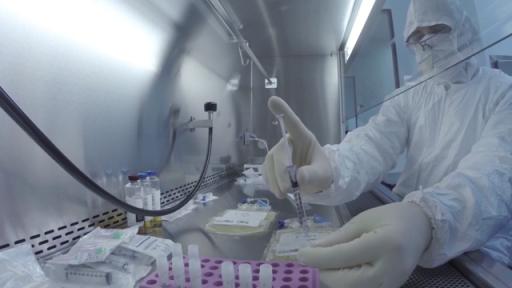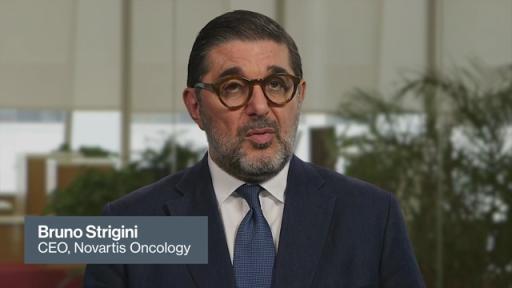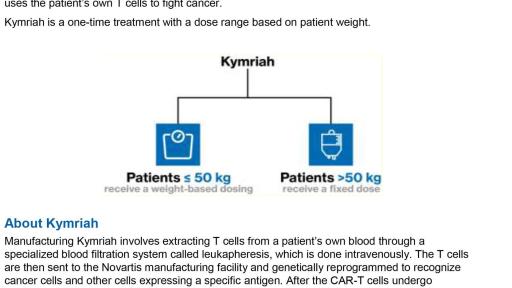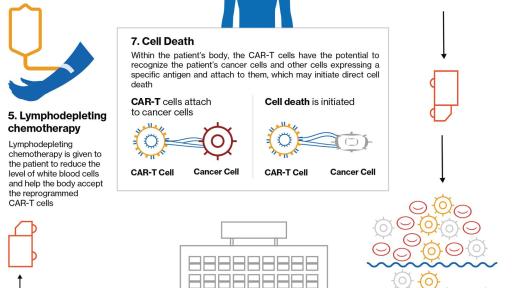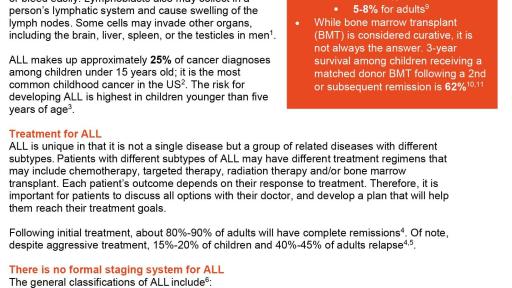Novartis receives first ever FDA approval for a CAR-T cell therapy, Kymriah™ (tisagenlecleucel, CTL019), for children and young adults with B-cell ALL that is refractory or has relapsed at least twice
- First-in-class therapy showed an 83% (52/63) overall remission rate in this patient population with limited treatment options and historically poor outcomes1,2
- Novel approach to cancer treatment is the result of pioneering CAR-T cell therapy collaboration with University of Pennsylvania
- Reproducible, flexible and validated manufacturing process builds on years of global clinical trial experience at our facility in New Jersey, US
- Novartis also announces innovative collaboration with the US Centers for Medicare and Medicaid Services
East Hanover, NJ, August 30, 2017 Novartis announced today that the US Food and Drug Administration (FDA) has approved Kymriah™(tisagenlecleucel) suspension for intravenous infusion, formerly CTL019, the first chimeric antigen receptor T cell (CAR-T) therapy, for the treatment of patients up to 25 years of age with B-cell precursor acute lymphoblastic leukemia (ALL) that is refractory or in second or later relapse. Kymriah is a novel immunocellular therapy and a one-time treatment that uses a patient’s own T cells to fight cancer. Kymriah is the first therapy based on gene transfer approved by the FDA.
“At Novartis, we have a long history of being at the forefront of transformative cancer treatment,” said Joseph Jimenez, CEO of Novartis. “Five years ago, we began collaborating with the University of Pennsylvania and invested in further developing and bringing what we believed would be a paradigm-changing immunocellular therapy to cancer patients in dire need. With the approval of Kymriah, we are once again delivering on our commitment to change the course of cancer care.”
“We are so proud to be part of this historic moment in cancer treatment and are deeply grateful to our researchers, collaborators, and the patients and families who participated in the Kymriah clinical program,” said Bruno Strigini, CEO of Novartis Oncology. “As a breakthrough immunocellular therapy for children and young adults who desperately need new options, Kymriah truly embodies our mission to discover new ways to improve patient outcomes and the way cancer is treated.”
The FDA has approved a Risk Evaluation and Mitigation Strategy (REMS) for Kymriah. The REMS program serves to inform and educate healthcare professionals about the risks that may be associated with Kymriah treatment. To support safe patient access, Novartis is establishing a network of certified treatment centers throughout the country which will be fully trained on the use of Kymriah and appropriate patient care.
There has been an urgent need for novel treatment options that improve outcomes for patients with relapsed or refractory (r/r) B-cell precursor ALL, whose prognosis is poor. Patients often undergo multiple treatments including chemotherapy, radiation, targeted therapy or stem cell transplant, yet less than 10% of patients survive five years2,3.
Kymriah is an innovative immunocellular therapy that is a one-time treatment. Kymriah uses the 4-1BB costimulatory domain in its chimeric antigen receptor to enhance cellular expansion and persistence. In 2012, Novartis and the University of Pennsylvania (Penn) entered into a global collaboration to further research, develop and commercialize CAR-T cell therapies, including Kymriah, for the investigational treatment of cancers.
“This therapy is a significant step forward in individualized cancer treatment that may have a tremendous impact on patients’ lives,” said Carl June, MD, the Richard W. Vague Professor of Immunotherapy, Director of the Center for Cellular Immunotherapies in Penn’s Perelman School of Medicine, who is a pioneer of this new treatment. “Through our collaboration with Novartis, we are creating the next wave of immunocellular cancer treatments, and are eager to progress CAR-T therapy in a host of hematologic and other cancer types.”
In close collaboration with Novartis and Penn, Children’s Hospital of Philadelphia (CHOP) was the first institution to investigate Kymriah in the treatment of pediatric patients leading the single site trial.
“Tisagenlecleucel is the first CAR-T therapy to demonstrate early, deep and durable remission in children and young adults with relapsed or refractory B-cell ALL,” said Stephan Grupp, MD, PhD, the Yetta Deitch Novotny Professor of Pediatrics at the Perelman School of Medicine at Penn, and Director of the Cancer Immunotherapy Frontier Program at Children’s Hospital of Philadelphia (CHOP). “We’ve never seen anything like this before and I believe this therapy may become the new standard of care for this patient population.”
Novartis is committed to ensuring eligible patients have access to Kymriah, and is working to ensure payers understand the value of Kymriah and provide coverage for patients. To address the unique aspects of the therapy, Novartis has also developed various patient access programs to support safe and timely access for patients. Novartis is also providing traditional support to patients by helping them navigate insurance coverage and providing financial assistance for those who are uninsured or underinsured.
Novartis plans additional filings for Kymriah in the US and EU later this year, including applications with the FDA and European Medicines Agency (EMA), for the treatment of adult patients with r/r diffuse large B-cell lymphoma (DLBCL). Additional filings beyond the US and EU are anticipated in 2018.
Groundbreaking Collaboration with the Centers for Medicare and Medicaid Services
Novartis also announced a novel collaboration with the United States Centers for Medicare and Medicaid Services (CMS) focused on improving efficiencies in current regulatory requirements in order to deliver value-based care and ensure access for this specific patient population.
This approach is intended to include indication-based pricing for medicines and supports payments for a medicine, such as Kymriah for its initial indication, based on the clinical outcomes achieved, which would eliminate inefficiencies from the healthcare system. Other value-based approaches related to future indications for Kymriah and CAR-T cell therapies are under discussion.
Furthermore, Novartis is collaborating with CMS to make an outcomes-based approach available to allow for payment only when pediatric and young adult ALL patients respond to Kymriah by the end of the first month. Future potential indications would be reviewed for the most relevant outcomes-based approach.
“Novartis has been at the forefront of outcomes-based pricing and is very pleased to work with CMS on this first-of-its-kind collaboration with a technology that has the potential to transform cancer care,” said Joseph Jimenez, CEO of Novartis. “We look forward to continuing to work with CMS to potentially expand this approach to other products and disease states.”
About Kymriah Manufacturing
Kymriah will be manufactured for each individual patient using their own cells at the Novartis Morris Plains, New Jersey facility. Novartis has designed a reliable and integrated manufacturing and supply chain platform that allows for an individualized treatment approach on a global scale. This process includes cryopreservation of a patient’s harvested (or leukapheresed) cells, giving treating physicians and centers the flexibility to initiate therapy with Kymriah based on the individual patient’s condition. Building on our experience, having manufactured CAR-T cells for over 250 patients from 11 countries across various indications, we have demonstrated a reproducible product. Novartis continues to advance its CAR-T manufacturing expertise in Morris Plains, where we have been supplying CAR-T cells for global clinical trials and where we continue to invest in support of the anticipated demand to meet the needs of patients.
Kymriah Pivotal Study Results
The FDA approval of Kymriah is based on the results of the pivotal open-label, multicenter, single-arm Phase II ELIANA trial, the first pediatric global CAR-T cell therapy registration trial examining patients in 25 centers in the US, EU, Canada, Australia and Japan. In this Novartis-sponsored study, 68 patients were infused and 63 were evaluable for efficacy. Results show 83% (52 of 63; 95% confidence interval [CI]: 71%-91%) of patients who received treatment with Kymriah achieved complete remission (CR) or CR with incomplete blood count recovery (CRi) within three months of infusion. In addition, no minimal residual disease (MRD) – a blood marker that indicates potential relapse – was detected among responding patients. Median duration of remission was not reached (95% CI: 7.5-NE)1.
The most common (>20%) adverse reactions in the ELIANA trial are cytokine release syndrome (CRS), hypogammaglobulinemia, infections-pathogen unspecified, pyrexia, decreased appetite, headache, encephalopathy, hypotension, bleeding episodes, tachycardia, nausea, diarrhea, vomiting, viral infectious disorders, hypoxia, fatigue, acute kidney injury and delirium. In the study, 49% of patients treated with Kymriah experienced grade 3 or 4 CRS, an on-target effect of the treatment that may occur when the engineered cells become activated in the patient’s body. CRS was managed globally using prior site education and implementation of the CRS treatment algorithm. Within eight weeks of treatment, 18% of patients experienced grade 3 or 4 neurologic events. There were no incidents of cerebral edema. The most common neurologic events were encephalopathy (34%), headache (37%), delirium (21%), anxiety (13%) and tremor (9%).
Novartis Leadership in Immuno-Oncology
Novartis is at the forefront of investigational immunocellular therapy and was the first pharmaceutical company to significantly invest in CAR-T research, work with pioneers in CAR-T and initiate global CAR-T trials. Kymriah, the first approved CAR-T cell therapy, is the cornerstone of this strategy. Active research programs are underway targeting other hematologic malignancies and solid tumors, and include efforts focused on next generation CAR-Ts that involve simplified manufacturing schemes and gene edited cells.
In April 2017, the FDA granted Breakthrough Therapy designation to CTL019 based on data from the JULIET study, the first multi-center global registration study for CTL019 in adult patients with r/r DLBCL.
About ALL
ALL is a cancer of the lymphocytes, a type of white blood cell involved in the body’s immune system. In people with ALL, the abnormal cells crowd other types of cells in the bone marrow, preventing the production of red blood cells (which carry oxygen), other types of white blood cells and platelets (parts of the blood needed for clotting). As a result, those with ALL may be anemic, more likely to get infections and bruise or bleed easily4.
ALL comprises approximately 25% of cancer diagnoses among children under 15 years old and is the most common childhood cancer in the US5. Despite overall improvements in outcomes of pediatric/young adult B-cell ALL, effective treatment options for patients that have relapsed or are refractory to treatment are limited6,7,8.
Kymriah™ (tisagenlecleucel) Important Safety information
The full prescribing information, including Boxed WARNING, for Kymriah can be found at: https://www.pharma.us.novartis.com/sites/www.pharma.us.novartis.com/files/kymriah.pdf
Kymriah may cause side effects that are fatal or life-threatening, such as Cytokine Release Syndrome (CRS) or Neurological Toxicities. Patients with CRS may experience symptoms including high fever, difficulty breathing, chills/shaking chills, severe nausea, vomiting and diarrhea, severe muscle or joint pain, very low blood pressure or dizziness/lightheadedness. Patients may be admitted to the hospital for CRS and treated with other medications.
Patients with neurological toxicities may experience symptoms such as altered or decreased consciousness, headaches, delirium, confusion, agitation, anxiety, seizures, difficulty speaking and understanding, or loss of balance. Patients should be advised to call their health care provider or get emergency help right away if they experience any of these signs and symptoms of CRS or neurological toxicities.
Because of the risk of CRS and neurological toxicities, Kymriah is only available through a restricted program under a Risk Evaluation and Mitigation Strategy (REMS) called Kymriah REMS.
Serious allergic reactions, including anaphylaxis, may occur after Kymriah infusion. Kymriah can increase the risk of life-threatening infections that may lead to death. Patients should be advised to tell their health care provider right away if they develop fever, chills, or any signs or symptoms of an infection.
Patients may experience prolonged low blood cell counts (cytopenia), where one or more types of blood cells (red blood cells, white blood cells, or platelets) are decreased. The patient’s health care provider will do blood tests to check all of their blood cell counts after treatment with Kymriah. Patients should be advised to tell their health care provider right away if they get a fever, are feeling tired, or have bruising or bleeding.
Patients may experience hypogammaglobulinemia, a condition in which the level of immunoglobulins (antibodies) in the blood is low and the risk of infection is increased. It is expected that patients may develop hypogammaglobulinemia with Kymriah, and may need to receive immunoglobulin replacement for an indefinite amount of time following treatment with Kymriah. Patients should tell their health care provider about their treatment with Kymriah before receiving a live virus vaccine.
After treatment with Kymriah, patients will be monitored life-long by their health care provider, as they may develop secondary cancers or recurrence of their leukemia.
Patients should not drive, operate heavy machinery, or do other dangerous activities for 8 weeks after receiving Kymriah because the treatment can cause temporary memory and coordination problems, including sleepiness, confusion, weakness, dizziness and seizures.
Some of the most common side effects of Kymriah included: difficulty breathing, fever (100.4°F/38°C or higher), chills/shaking chills, confusion, severe nausea, vomiting and diarrhea, severe muscle or joint pain, very low blood pressure, and dizziness/lightheadedness. However, these are not all of the possible side effects of Kymriah. Patients should talk to their health care provider for medical advice about side effects.
Prior to a female patient starting treatment with Kymriah, their health care provider may do a pregnancy test. There is no information available for Kymriah use in pregnant or breast-feeding women. Therefore, Kymriah is not recommended for women who are pregnant or breast feeding. If either sex partner has received Kymriah, patients should talk to their health care provider about birth control and pregnancy.
Patients should tell their health care provider about all the medicines they take, including prescription and over-the-counter medicines, vitamins, and herbal supplements.
After receiving Kymriah, patients should be advised that some commercial HIV tests may cause a false positive test result. Patients should also be advised not to donate blood, organs, or tissues and cells for transplantation after receiving Kymriah.
Disclaimer
This press release contains forward-looking statements within the meaning of the United States Private Securities Litigation Reform Act of 1995. Forward-looking statements can generally be identified by words such as “pioneering,” “commitment,” “breakthrough,” “mission,” “is establishing,” “will,” “investigational,” “step forward,” “may,” “are creating,” “next wave,” “eager to progress,” “committed,” “is working to,” “plans,” “later this year,” “anticipated,” “would,” “under discussion,” “potential,” “look forward to,” “potentially,” “strategy,” “underway,” “efforts,” “focused on,” “next generation,” “continues to advance,” “continue to invest,” “Breakthrough Therapy designation,” or similar terms, or by express or implied discussions regarding potential marketing approvals, new indications or labeling for Kymriah and the other investigational products described in this press release, regarding our ability to implement, scale and sustain commercial manufacturing for Kymriah or the other investigational products described in this press release, regarding our ability to build a network of treatment centers to offer Kymriah or the other investigational products described in this press release, regarding the potential future success of patient support programs or patient access solutions for Kymriah or of the collaboration with CMS to establish indication-based pricing and outcomes-based payments for CAR-T cell therapies, or regarding potential future revenues from such products. You should not place undue reliance on these statements. Such forward-looking statements are based on our current beliefs and expectations regarding future events, and are subject to significant known and unknown risks and uncertainties. Should one or more of these risks or uncertainties materialize, or should underlying assumptions prove incorrect, actual results may vary materially from those set forth in the forward-looking statements. There can be no guarantee that Kymriah or the other investigational products described in this press release will be submitted or approved for sale or for any additional indications or labeling in any market, or at any particular time. Neither can there be any guarantee that Novartis will secure continued approval for Kymriah or the other investigational products described in this press release following accelerated approval. Nor can there be any guarantee that Novartis will successfully implement, scale and sustain commercial manufacturing for Kymriah or the other investigational products described in this press release, or successfully build a network of treatment centers to offer Kymriah or the other investigational products described in this press release. Neither can there be any guarantee that Novartis will successfully implement patient support programs or patient access solutions for Kymriah or the other investigational products described in this press release, or that the collaboration with CMS to establish indication-based pricing and outcomes-based payments for CAR-T cell therapies will be successful or achieve its intended goals. Nor can there be any guarantee that Kymriah or the other investigational products described in this press release will be commercially successful in the future. In particular, our expectations regarding Kymriah and such other investigational products could be affected by, among other things, our ability to successfully implement, scale and sustain commercial manufacturing and build a network of treatment centers; our ability to successfully implement patient support programs and patient access solutions; our ability to secure continued approval following accelerated approval; our ability to successfully establish indication-based pricing and outcomes-based payments for CAR-T cell therapies in collaboration with CMS; the uncertainties inherent in research and development, including clinical trial results and additional analysis of existing clinical data; regulatory actions or delays or government regulation generally; our ability to obtain or maintain proprietary intellectual property protection; the particular prescribing preferences of physicians and patients; global trends toward health care cost containment, including government, payor and general public pricing and reimbursement pressures; general economic and industry conditions, including the effects of the persistently weak economic and financial environment in many countries; safety, quality or manufacturing issues, and other risks and factors referred to in Novartis AG’s current Form 20-F on file with the US Securities and Exchange Commission. Novartis is providing the information in this press release as of this date and does not undertake any obligation to update any forward-looking statements contained in this press release as a result of new information, future events or otherwise.
About Novartis
Located in East Hanover, NJ Novartis Pharmaceuticals Corporation is an affiliate of Novartis which provides innovative healthcare solutions that address the evolving needs of patients and societies. Headquartered in Basel, Switzerland, Novartis offers a diversified portfolio to best meet these needs: innovative medicines, cost-saving generic and biosimilar pharmaceuticals and eye care. Novartis has leading positions globally in each of these areas. In 2016, the Group achieved net sales of USD 48.5 billion, while R&D throughout the Group amounted to approximately USD 9.0 billion. Novartis Group companies employ approximately 119,000 full-time-equivalent associates. Novartis products are sold in approximately 155 countries around the world. For more information, please visit http://www.novartis.com.
Novartis is on Twitter. Sign up to follow @Novartis at http://twitter.com/novartis and @NovartisCancer at http://twitter.com/novartiscancer
For Novartis multimedia content, please visit www.novartis.com/news/media-library
For questions about the site or required registration, please contact [email protected]
References
- Kymriah (tisagenlecleucel) Prescribing information. East Hanover, New Jersey, USA: Novartis Pharmaceuticals Corporation; August 2017.
- Ronson, A., Tvito, A., Rowe, JM., “Treatment of Relapsed/Refractory Acute Lymphoblastic Leukemia in Adults.” Current Oncology Reports, 2016 Jun;18(6):39. https://www.ncbi.nlm.nih.gov/pubmed/27207612. Accessed August 4, 2017.
- Leukemia & Lymphoma Society, “Acute Lymphoblastic Leukemia.” https://www.lls.org/leukemia/acute-lymphoblastic-leukemia/treatment/relapsed-and-refractory. Accessed August 4, 2017.
- National Cancer Institute, “Childhood Acute Lymphoblastic Leukemia Treatment (PDQ®) – Patient Version.” https://www.cancer.gov/types/leukemia/patient/child-all-treatment-pdq#link/_1. Accessed August 4, 2017.
- Howlader, N., Noone, A.. M, Krapcho, M., et al. SEER Cancer Statistics Review, 1975–2010. National Cancer Institute, April 2013; Section 28.9 (12).
- Oudot, C.., Auclerc, F.., Levy, V., et al. Prognostic Factors for Leukemia Induction Failure in Children With Acute Lymphoblastic Leukemia and Outcome After Salvage Therapy: The FRALLE 93 Study. Journal of Clinical Oncology, March 2008; Volume 28 (9).
- Chessels, J., Veys, P., Kempski, H., et al. Long-term follow-up of relapsed childhood acute lymphoblastic leukaemia. British Journal of Hematology, 2003; 123 (3).
- Reismuller, B., Peters, C., Dworzak, M., et al. Outcome of children and adolescents with a second or third relapse of acute lymphoblastic leukemia (ALL): a population-based analysis of the Austrian ALL-BFM (Berlin-Frankfurt-Münster) Study Group. Journal of Pediatric Hematology/Oncology. July 2013; 35 (5).
Novartis Media Relations
Central media line: +41 61 324 2200
E-mail: [email protected]
| Eric Althoff Novartis Global Media Relations 1-212-830-2408 (office) 1-646-438-4335 (mobile) [email protected] | Fiona Phillips Novartis Oncology Communications +1 862-778-7705 (direct) +1 862-217-9396 (mobile) [email protected] |

